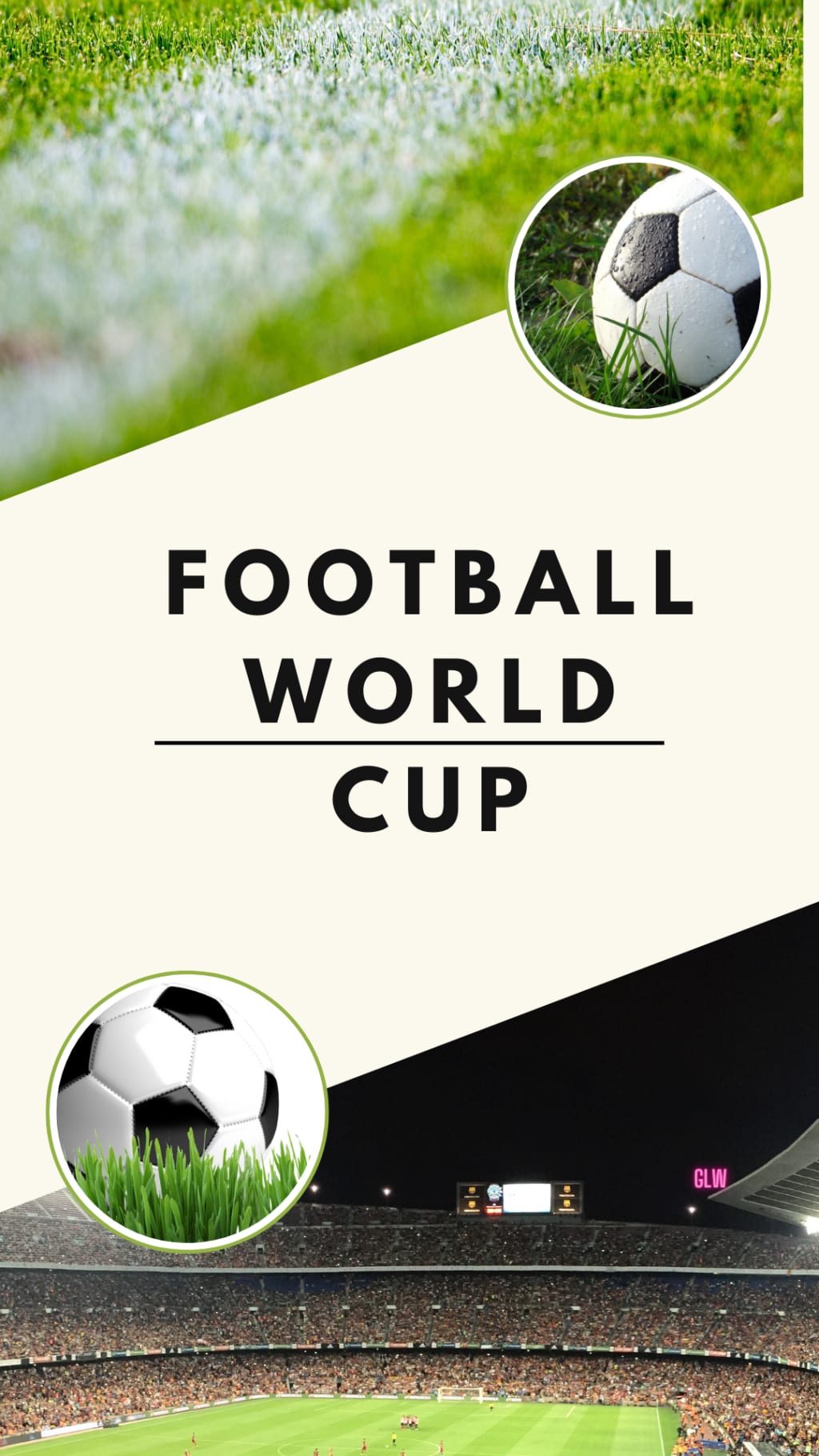
History of the FIFA World Cup
The world's first international football match was a challenge match played in Glasgow in 1872 between Scotland and England.[7] The first international tournament for nations, the inaugural British Home Championship, took place in 1884 which included games between England, Scotland, Wales and Ireland.[8] As football grew in popularity in other parts of the world at the start of the 20th century, it was held as a demonstration sport with no medals awarded at the 1900 and 1904 Summer Olympics (however, the International Olympic Committee has retroactively upgraded their status to official events), and at the 1906 Intercalated Games.
After FIFA was founded in 1904, it tried to arrange an international football tournament between nations outside the Olympic framework in Switzerland in 1906. These were very early days for international football, and the official history of FIFA describes the competition as having been a failure.
At the 1908 Summer Olympics in London, football became an official competition. Planned by The Football Association (FA), England's football governing body, the event was for amateur players only and was regarded suspiciously as a show rather than a competition. Great Britain (represented by the England national amateur football team) won the gold medals. They repeated the feat at the 1912 Summer Olympics in Stockholm.
With the Olympic event continuing to be contested only between amateur teams, Sir Thomas Lipton organised the Sir Thomas Lipton Trophy tournament in Turin in 1909. The Lipton tournament was a championship between individual clubs (not national teams) from different nations, each one of which represented an entire nation. The competition is sometimes described as The First World Cup,[12] and featured the most prestigious professional club sides from Italy, Germany and Switzerland, but the FA of England refused to be associated with the competition and declined the offer to send a professional team. Lipton invited West Auckland, an amateur side from County Durham, to represent England instead. West Auckland won the tournament and returned in 1911 to successfully defend their title.[13] Prior to the Lipton competition, from 1876 to 1904, games that were considered the "football world championship" were meetings between leading English and Scottish clubs, such as the 1895 game between Sunderland A.F.C. and the Heart of Midlothian F.C., which Sunderland won.
In 1914, FIFA agreed to recognise the Olympic tournament as a "world football championship for amateurs", and took responsibility for managing the event.[15] This paved the way for the world's first intercontinental football competition for nations, at the 1920 Summer Olympics, contested by Egypt and 13 European teams, and won by Belgium.[16] Uruguay won the next two Olympic football tournaments in 1924 and 1928. Those were also the first two open world championships, as 1924 was the start of FIFA's professional era, and is the reason why Uruguay is allowed to wear 4 stars.
World Cups before World War IIDue to the success of the Olympic football tournaments, FIFA, with President Jules Rimet as the driving force, again started looking at staging its own international tournament outside of the Olympics. On 28 May 1928, the FIFA Congress in Amsterdam decided to stage a world championship itself.[19] With Uruguay now two-time official football world champions and to celebrate their centenary of independence in 1930, FIFA named Uruguay as the host country of the inaugural World Cup tournament.
The national associations of selected nations were invited to send a team, but the choice of Uruguay as a venue for the competition meant a long and costly trip across the Atlantic Ocean for European sides in the context of an economic crisis. As such, no European country pledged to send a team until two months before the start of the competition. Rimet eventually persuaded teams from Belgium, France, Romania, and Yugoslavia to make the trip.In total, 13 nations took part: seven from South America, four from Europe, and two from North America.
Estadio Centenario, the location of the first World Cup final in 1930 in Montevideo, Uruguay
The first two World Cup matches took place simultaneously on 13 July 1930, and were won by France and the US, who defeated Mexico 4–1 and Belgium 3–0 respectively. The first goal in World Cup history was scored by Lucien Laurent of France.[22] In the final, Uruguay defeated Argentina 4–2 in front of 93,000 people in Montevideo, and became the first nation to win the World Cup.[23] After the creation of the World Cup, FIFA and the IOC disagreed over the status of amateur players, and so football was dropped from the 1932 Summer Olympics.[24][25] After the IOC and FIFA worked out their differences, Olympic football returned at the 1936 Summer Olympics, but was now overshadowed by the more prestigious World Cup.
The issues facing the early World Cup tournaments were the difficulties of intercontinental travel, and war. Few South American teams were willing to travel to Europe for the 1934 World Cup and all North and South American nations except Brazil and Cuba boycotted the 1938 tournament. Brazil was the only South American team to compete in both. The 1942 and 1946 competitions, which Germany and Brazil sought to host,were cancelled due to World War II and its aftermath.
World Cups after World War II
The opening game of the Maracanã Stadium in Rio de Janeiro, Brazil, shortly before the 1950 FIFA World Cup
The 1950 World Cup, held in Brazil, was the first to include British football associations. Scotland, England, Wales and Northern Ireland withdrew from FIFA in 1920, partly out of unwillingness to play against the countries they had been at war with, and partly as a protest against foreign influence on football.[28] The teams rejoined in 1946 following FIFA's invitation.[29] The tournament also saw the return of 1930 champions Uruguay, who had boycotted the previous two World Cups. Uruguay won the tournament again after defeating the host nation Brazil, in the match called "Maracanazo" (Portuguese: Maracanaço).[30]
In the tournaments between 1934 and 1978, 16 teams competed in each tournament, except in 1938, when Austria was absorbed into Germany after qualifying, leaving the tournament with 15 teams, and in 1950, when India, Scotland, and Turkey withdrew, leaving the tournament with 13 teams.[31] Most of the participating nations were from Europe and South America, with a small minority from North America, Africa, Asia, and Oceania. These teams were usually defeated easily by the European and South American teams. Until 1982, the only teams from outside Europe and South America to advance out of the first round were: United States, semi-finalists in 1930; Cuba, quarter-finalists in 1938; North Korea, quarter-finalists in 1966; and Mexico, quarter-finalists in 1970.
Expansion to 24 and 32 teams
Inside Soccer City in Johannesburg, South Africa, during a match at the 2010 FIFA World Cup
The tournament was expanded to 24 teams in 1982,[32] and then to 32 in 1998,[33] allowing more teams from Africa, Asia and North America to take part. Since then, teams from these regions have enjoyed more success, with several having reached the quarter-finals: Mexico, quarter-finalists in 1986; Cameroon, quarter-finalists in 1990; South Korea, finishing in fourth place in 2002; Senegal, along with USA, both quarter-finalists in 2002; Ghana, quarter-finalists in 2010; Costa Rica, quarter-finalists in 2014; and Morocco, finishing in fourth place in 2022. European and South American teams continue to dominate, e.g., the quarter-finalists in 1994, 1998, 2006 and 2018 were all from Europe or South America and so were the finalists of all tournaments so far.
Two hundred teams entered the 2002 FIFA World Cup qualification rounds. 198 nations attempted to qualify for the 2006 FIFA World Cup. A record 204 countries entered qualification for the 2010 FIFA World Cup.
Expansion to 48 teams
In October 2013, Sepp Blatter spoke of guaranteeing the Caribbean Football Union's region a position in the World Cup.[35] In the edition of 25 October 2013 of the FIFA Weekly Blatter wrote that: "From a purely sporting perspective, I would like to see globalisation finally taken seriously, and the African and Asian national associations accorded the status they deserve at the FIFA World Cup. It cannot be that the European and South American confederations lay claim to the majority of the berths at the World Cup."[36] Those two remarks suggested to commentators that Blatter could be putting himself forward for re-election to the FIFA Presidency.
Following the magazine's publication, Blatter's would-be opponent for the FIFA Presidency, UEFA President Michel Platini, responded that he intended to extend the World Cup to 40 national associations, increasing the number of participants by eight. Platini said that he would allocate an additional berth to UEFA, two each to the Asian Football Confederation and the Confederation of African Football, two shared between CONCACAF and CONMEBOL, and a guaranteed place for the Oceania Football Confederation.[38] Platini was clear about why he wanted to expand the World Cup. He said: "[The World Cup is] not based on the quality of the teams because you don't have the best 32 at the World Cup ... but it's a good compromise. ... It's a political matter so why not have more Africans? The competition is to bring all the people of all the world. If you don't give the possibility to participate, they don't improve.
In October 2016, FIFA president Gianni Infantino stated his support for a 48-team World Cup in 2026.[39] On 10 January 2017, FIFA confirmed the 2026 World Cup will have 48 finalist teams.
2015 FIFA corruption case
Main article: 2015 FIFA corruption case
By May 2015, the games were under a particularly dark cloud because of the 2015 FIFA corruption case, allegations and criminal charges of bribery, fraud and money laundering to corrupt the issuing of media and marketing rights (rigged bids) for FIFA games,[41] with FIFA officials accused of taking bribes totaling more than $150 million over 24 years. In late May, the US Department of Justice announced a 47-count indictment with charges of racketeering, wire fraud and money laundering conspiracy against 14 people. Arrests of over a dozen FIFA officials were made since that time, particularly on 29 May and 3 December.[42] By the end of May 2015, a total of nine FIFA officials and five executives of sports and broadcasting markets had already been charged on corruption. At the time, FIFA president Sepp Blatter announced he would relinquish his position in February 2016.
On 4 June 2015 Chuck Blazer while co-operating with the FBI and the Swiss authorities admitted that he and the other members of FIFA's then-executive committee were bribed in order to promote the 1998 and 2010 World Cups.[44] On 10 June 2015, Swiss authorities seized computer data from the offices of Sepp Blatter.[45] The same day, FIFA postponed the bidding process for the 2026 FIFA World Cup in light of the allegations surrounding bribery in the awarding of the 2018 and 2022 tournaments. Then-secretary general Jérôme Valcke stated, "Due to the situation, I think it's nonsense to start any bidding process for the time being."[46] On 28 October 2015, Blatter and FIFA VP Michel Platini, a potential candidate for presidency, were suspended for 90 days; both maintained their innocence in statements made to the news media.
On 3 December 2015 two FIFA vice-presidents were arrested on suspicion of bribery in the same Zurich hotel where seven FIFA officials had been arrested in May.[48] An additional 16 indictments by the US Department of Justice were announced on the same day.
Biennial World Cup proposition
A biennial World Cup plan was first proposed by the Saudi Arabian Football Federation at the 71st FIFA Congress on 21 May 2021 and prominently backed by former Arsenal manager Arsène Wenger and national federations in Africa and Asia.[50] Continental confederations such as UEFA and CONMEBOL are not on board with the plan[51][52] but, in total, the idea is supported by 166 of the 210 member associations of FIFA.[53]
Other FIFA tournaments
The BC Place in Vancouver hosting a 2015 Women's World Cup match An equivalent tournament for women's football, the FIFA Women's World Cup, was first held in 1991 in China.[54] The women's tournament is smaller in scale and profile than the men's, but is growing; the number of entrants for the 2007 tournament was 120, more than double that of 1991.
Men's football has been included in every Summer Olympic Games except 1896 and 1932. Unlike many other sports, the men's football tournament at the Olympics is not a top-level tournament, and since 1992, an under-23 tournament with each team allowed three over-age players.[56] Women's football made its Olympic debut in 1996.
The FIFA Confederations Cup was a tournament held one year before the World Cup at the World Cup host nation(s) as a dress rehearsal for the upcoming World Cup. It is contested by the winners of each of the six FIFA confederation championships, along with the FIFA World Cup champion and the host country.[57] The first edition took place in 1992 and the last edition was played in 2017. In March 2019, FIFA confirmed that the tournament would no longer be active owing to an expansion of the FIFA Club World Cup in 2021.
FIFA also organises international tournaments for youth football (FIFA U-20 World Cup, FIFA U-17 World Cup, FIFA U-20 Women's World Cup, FIFA U-17 Women's World Cup), club football (FIFA Club World Cup), and football variants such as futsal (FIFA Futsal World Cup) and beach soccer (FIFA Beach Soccer World Cup). The latter three do not have a women's version, although a FIFA Women's Club World Cup has been proposed.
The FIFA U-20 Women's World Cup is held biannually, including the year before each Women's World Cup. Both tournaments were awarded in a single bidding process on three occasions, with the U-20 tournament serving as a dress rehearsal for the larger competition each time (2010, 2014 and 2018)






Comments
There are no comments for this story
Be the first to respond and start the conversation.